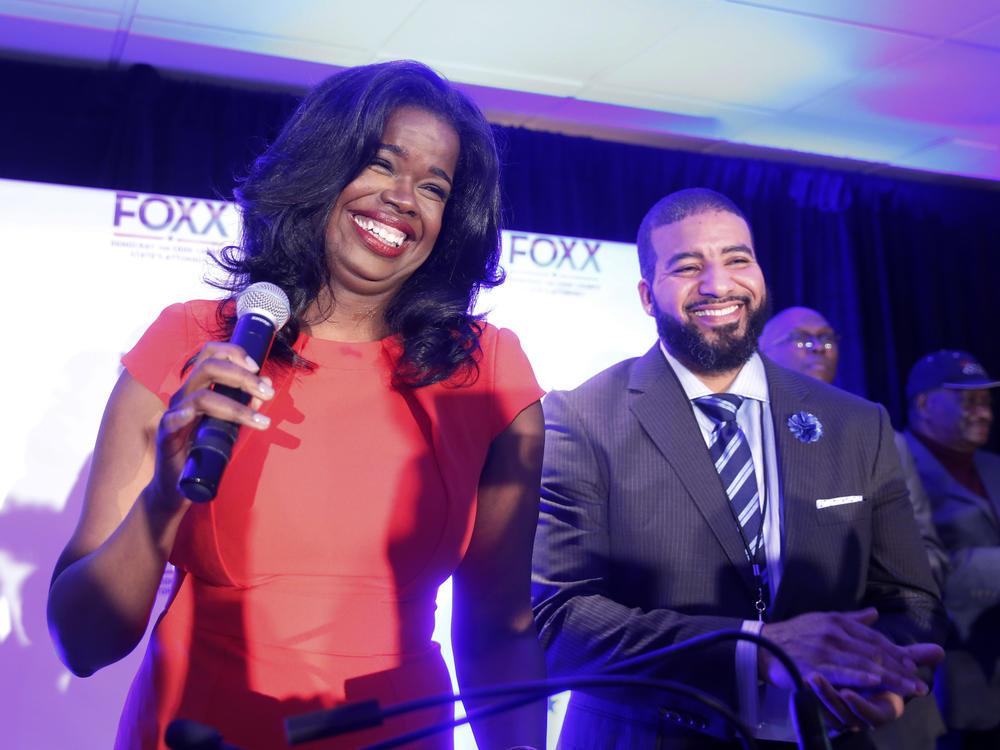Section Branding
Header Content
Newly Elected DAs Vow To Continue Reforms, End Policies Deemed Unfair
Primary Content
This month's elections, especially in the aftermath of this summer's protests against racial injustice, were seen as a test for criminal justice reforms. This was especially true for so-called progressive district attorneys.
Many policies in the higher-profile cities of Philadelphia, San Francisco and Chicago already had drawn the ire of some in law enforcement, including choosing not to prosecute certain low-level crimes, among other changes.
Those policies appear to be just fine with voters in cities with prosecutors who vowed to continue shaking things up.
A prime example is in Chicago, where Cook County State's Attorney Kim Foxx won her bid for re-election. The office is the second-largest in the country, (behind Los Angeles county) with more than 700 attorneys.
Foxx is the first black woman to lead it. She is considered one of the country's most prominent progressive prosecutors. First elected in 2016, she promised to transform a criminal justice system that disproportionately affects people of color. Despite some political stumbles, her re-election is an example of the movement's progression.
"It means, in this next term, doubling down on our efforts," says Foxx, "to make sure that people with substance use disorder or mental health issues have the resources they need in communities so we can stop the de facto use of our justice system" to help people in crisis.
Fox reduced charges for low-level offenses like retail theft, she steered some facing drug charges into treatment programs. She vacated the sentences of at least 100 men wrongfully convicted and survived a firestorm of controversy over how her office handled the case of a television celebrity who was accused of falsely claiming he was a victim of a hate crime.
The progressive push can also be found in Austin, Texas, where voters overwhelmingly selected Jose Garza to serve as the next district attorney of Travis County. Garza, a former public defender, says the typical hallmark of a prosecutor — conviction rates and longer sentences — is wrong-headed. He says criminalizing low-level drug use and prosecuting some non-violent offenses doesn't make communities safer and they won't be his priority.
"We also know that those kind of offenses are one of the greatest drivers of racial disparities in our criminal justice system," says Garza. "So we have made clear that when we take office we will end the prosecution of low-level drug offenses."
This summer's protests were sparked by the killing of George Floyd while in Minneapolis police custody. But his death was merely the latest involving police that sparked outrage. Among the thorniest questions remains how prosecutors handle complaints of police violence.
That played out in a run-off race that drew national attention and big-money donors as voters selected a district attorney for Los Angeles County, the country's largest prosecutor's office.
George Gascon, the former district attorney for San Francisco and a former police chief, will head the office in what's considered a major victor for the progressive movement. Gascon replaces Jackie Lacey, who is the first Black person and first woman to hold the post. She often faced criticism from protesters who charged Lacey did not aggressively pursue charges against police involved in the shootings of unarmed men. Gascon, who faced scrutiny himself, promised to promptly implement a number of changes.
"We would eliminate the death penalty. We'd Stop prosecuting children as adults. We would start creating more diversion opportunities especially for those that are mentally ill," says Gascon.
The push to elect reform- minded district attorneys began six years ago in the aftermath of nationwide demonstrations spurred by the fatal shooting of Michael Brown, an 18-year-old black man, by Darren Wilson, a white police officer in Ferguson, Mo.
The movement is growing but still small. Out of more than 2,400 elected prosecutors fewer than 100 pursue reform agendas.
Scott Roberts, the senior director of campaigns for the activist group, Color of Change, says there has been lots of pushback from law enforcement, police unions and conservative politicians.
"We think we caught a lot of those folks off guard," says Roberts. "They weren't ready for a movement that would focus on prosecutor elections. "
There's growing attention now. A speech at the National Convention of the Fraternal Order of Police last year by US Atty. Gen. William Barr made that evident. He chastised progressive prosecutors, calling them anti-law enforcement district attorneys who "style themselves social justice reformers, and spend their time undercutting the police, letting criminals off the hook and refusing to enforce the laws."
John Jay College of Criminal Justice Professor Peter Moskos says despite the Barr's criticism, reform-minded prosecutors are raising real issues. But, he adds, their focus has to be on public safety.
"The idea that if we just stop arresting and prosecuting non-violent offenders and everything will get better is a dream world," says Moskos. "We haven't seen that happen anywhere."
Prosecutors Foxx, Gascon and Garza say they are providing a necessary and more nuanced approach and not compromising public safety.
Jami Hodge is the director of the Reshaping Prosecution Program at the Vera Institute of Justice. She says with more progressive attorneys winning races and others staying in power, it speaks volumes about where the movement is heading. Hodge says that's especially true with Gascon and Foxx leading the country's largest prosecutor offices.
It shows, she says, how communities and organizers "are recognizing by changing one person, one person at the top, they can really see something different in the way their system is working in their local community."
That's a criminal justice reform that Hodge and other advocates hope will gain even more traction during the next election for prosecutors across the country.
Copyright 2020 NPR. To see more, visit https://www.npr.org.

